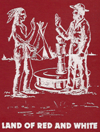 ALMOST A CENTENARIAN
ALMOST A CENTENARIAN
by Jean Kinch
My paternal grandfather, Frederick James Granger, was born on Christmas day in the year 1826. In the autumn of that year his parents began an ocean voyage from England to make a new life in Ontario, Canada. Before they reached the Canadian shore their son was born aboard ship somewhere on the Atlantic Ocean. It must have been a trying voyage for the young mother, as travel in those days was dangerous and at the best uncomfortable.
I know very little of Grandad's childhood, only that he told us that the only schooling he had was in the "school of hard knocks." I can recall many stories he used to tell of his youth in the logging and lumber camps of northern Ontario where he learned to work hard and to like his whiskey habits he never changed. He married a girl whom he called Phoebe, her real name was Mary Jane Stocks, and fathered four boys, William, Edward, Samuel and Abram, my father, and one daughter who choked to death on a beechnut when she was quite a young girl.
Grandad was an eighty-two year old widower when he came west with Dad and Mom in 1909 and when they came to Frog Lake in 1911 he came too and filed on a homestead on the east side of Laurier Lake. Dad and Mom built a shack on his homestead and lived there until they proved up on it for him, before they built their home on No. 18. Later Grandad sold his land to David Jack of Kitscoty, Mom's uncle. From then on he made his home with us.
Although very old he was a strong and active man. I can remember how he loved working with the axe and saw, holding his own with the younger generation. My brothers, Fred and Earl, at times complained at having to help him saw stove wood with the cross-cut saw, but Grandad told them the exercise helped to keep them warm. After the gas powered circular saws were brought into the district he chopped down the trees for Dad and the boys to haul, and when it was sawed into firewood he did his share of splitting and piling it. Within three years of his death he chopped down trees, sawed them up with a bucksaw and piled the wood in the bush. Much of it was never hauled home and just a short time ago Mr. Emmanuel Meger, who rented the old homestead, asked me why the piles of wood were spotted here and there in the bush.
He got along very well with the Indian neighbors who worked for Dad or came to trade fish, wild meat or saskatoons and blueberries for potatoes, butter, lard, flour, tea or pork, in fact almost anything they could deal for. One afternoon when my brothers and I came home from school two Indians, Little Joe Kechino and his wife Margaret, and Grandad were having a high old time. Little Joe's team was tied to a tree in the yard and Grandad, hands joined with the two Indians, was dancing around the wagon. Mom hustled us into the house and sent us upstairs to tidy our rooms, forgetting that the upstairs windows gave a wonderful view of their antics. I don't know if it was the white man's home brew or the Indian's "moose milk" but, well, it was during prohibition and to quote from an old clipping:
"Thirsty days hath September,
April, June and November,
All the rest are thirsty, too,
Unless you make your own homebrew."
Grandad liked the annual Indian. Treaty celebrations and whenever possible made a point of being there. Three or four days before Treaty Day, Indians from other reserves began to gather at the place that the local Indian residents chose for the celebration. They came past our place from the west traveling in long lines of horse drawn wagons, some had an arch of leafy poplar boughs across the wagon box for shade. Each wagon was piled high with rolls of tents, blankets and other camping supplies and, in the midst of this, the squaws and papooses (Indian children) squatted cross-legged. The men sat on a heavy board across the front of the box, a few had a spring seat which must have been a luxury. Several loose colts followed the mares that pulled the wagons and each family brought one or more dogs. From amid the clouds of dust stirred up by the horses and wagons came the sounds of talking, and laughter, babies crying, dogs barking and mares nickering for their colts. Once in a while a line would stop for the colts to suck while a couple of young lads came to our house, carrying pails to get drinking water for the dusty passengers.
When I was about eight or nine years old Grandad took me on a tour of the camping grounds so I could see how the Indians lived during treaty. The children playing inside and outside the tents seemed so happy and the mothers gave them a gentle warning when they misbehaved. We watched the men playing a game with little sticks that resembled the game of "button, button, who's got the button" that we used to play. Years later I learned it was a gambling game, timed by the beat of the tom-toms. The women cooked meals in pots or pails hung over the campfires. He waited outside a tent while Mrs. Quinney, wife of Charles Quinney, Indian teacher and minister, took me inside to see a new baby, just a few hours old. The mother pulled back the blanket to show the little red face. She smiled and said, "She five dollar top", meaning the baby would receive the five dollars treaty money that each resident of the reserve was entitled to.
Mom had a hand washing machine with a hand wringer clamped on it. A wheel turned the dolly and this machine appeared to irritate Grandad, for each time he walked past it, on the rare occasions when it was not loaded with washing, he gave the wheel a twirl and remarked "Women don't have to work these days." He never tried turning it when it was loaded.
I have no memory of Grandad when his hands were not swollen and stiff with "rhumatiz." They were painful but he seldom complained. He enjoyed playing cards, casino and pedro, with Grandpa Jack, Grandpa Hall and Billy McCormick. The last few months of his life the "rhumatiz" crippled his hands until he could no longer play cards except when some of us grandchildren handled the cards for him while he told which card he wanted played. His mind remained clear until he passed away in October 1926, two months before his hundredth birthday. We could not enjoy that first Christmas when he was no longer with us to celebrate his birthday, which had become a traditional part of our Christmas.


